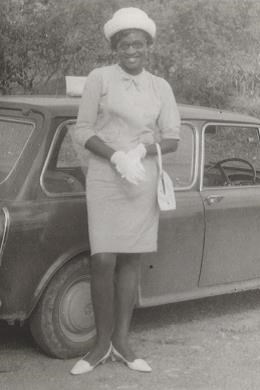
12 Jul 2019
Midwife’s journey among migration stories which helped shape Leeds
When a young Gloria Hanley left the Caribbean for England, it was the beginning of a story which would touch the lives of hundreds of Leeds families.
Her long and distinguished career as midwife spanned more than 40 years and saw her welcome new life into the world as she made a lasting impression on the city she now calls home.
More than half a century later, Gloria’s inspiring journey will feature in a new exhibition at Leeds City Museum celebrating those who travelled from their homeland in search of a new life and in doing so, helped shape the Leeds we know today.
Originally from St Kitts, Gloria arrived in the UK in 1968, training as a nurse before coming to Leeds in the early 1980s to pursue a career as a midwife. Working for the local NHS, she helped deliver babies across Leeds, but mainly supported families in the Harehills area.
Gloria, now 71, remembers Leeds being very different to today. She said: “I experienced pockets of racism where some clients’ husbands initially refused to let me into their homes because I was black.
“Despite that, I thoroughly enjoyed my midwifery career and have very fond memories of the babies I have delivered and the women that I have given care to.
“Now that I’m retired, I often meet past clients who tell me of their children’s progress and thank me for being their midwife. I know I gave very good care to all clients regardless of race or colour and feel very proud of my chosen career.”
Gloria, who lives in Moortown, continued to work as a midwife until 2008 and last year, the Royal College of Nursing recognised her outstanding contribution to BAME nursing, health and social care.
On display in the museum’s new exhibition, entitled A City and its Welcome: Three Centuries of Migrating to Leeds, will be Gloria’s midwifery bag, ID badge and the hat she once wore.
She added: “I’ve lived in Leeds for over forty years and have seen how the city has changed, sometimes beyond recognition. Initially I always went back to London for a good time but not anymore - Leeds is a thriving city and I love living here.
“When I was asked I had no hesitation lending my exhibits - I’m among many in the black community who has made a positive contribution to the city.”
Alongside Gloria’s objects will be exhibits from the Irish, Jewish, Muslim and Sikh communities.
Other items on display include a traditional Jewish kippah, a headdress worn by Orthodox male Jews, which has been customised with a Leeds United badge by a local fan.
A collection of toy houses brought to Leeds by Eva Mitchell from former Czechoslovakia in 1938 also feature, one of the only toys she was allowed to bring.
Amar Singh Deagon, a carpenter born in India, came to Leeds in 1966 and worked in construction across Yorkshire, including the building of Leeds Crown Court. His passport, reference letter and photograph are also on display.
Ruth Martin, Leeds City Museum’s curator of exhibitions, said: “Each of these people have told us their individual story about how and why they have come to call Leeds home today. Some have overcome unimaginable adversity, whilst others have travelled here in search of opportunity.
“Together, they paint a picture of a city built by immigrants, a place which has thrived economically and flourished culturally because of those who travelled here with a dream of making a new home for themselves and their families.
“The Leeds we know and love today wouldn’t be the same unique place without the knowledge, individuality and heritage they brought with them and it’s been a privilege to share their experiences.”
The exhibition is one of a number of projects taking place at the museum this year telling stories of migration in Leeds and the impact it has had on the city.
Councillor Judith Blake, leader of Leeds City Council, said: “Modern Leeds is a diverse and eclectic city which embraces and celebrates the many different cultures which call it home.
“Becoming that cosmopolitan place has been a long and fascinating journey which has seen those who have come from abroad to make a home here overcome some huge individual and collective challenges and accomplish remarkable things.
“In doing so, they have become a part of our heritage and history, making a lasting and indelible impact on Leeds and its culture.”
A City and its Welcome: Three Centuries of Migrating to Leeds will be at Leeds City Museum from July 12 until January, 2020.
For more details, please visit: https://www.leeds.gov.uk/museumsandgalleries/leedscitymuseum/leeds-migration-stories
ENDS
For media enquiries contact:
Leeds City Council Communications team
communicationsteam@leeds.gov.uk